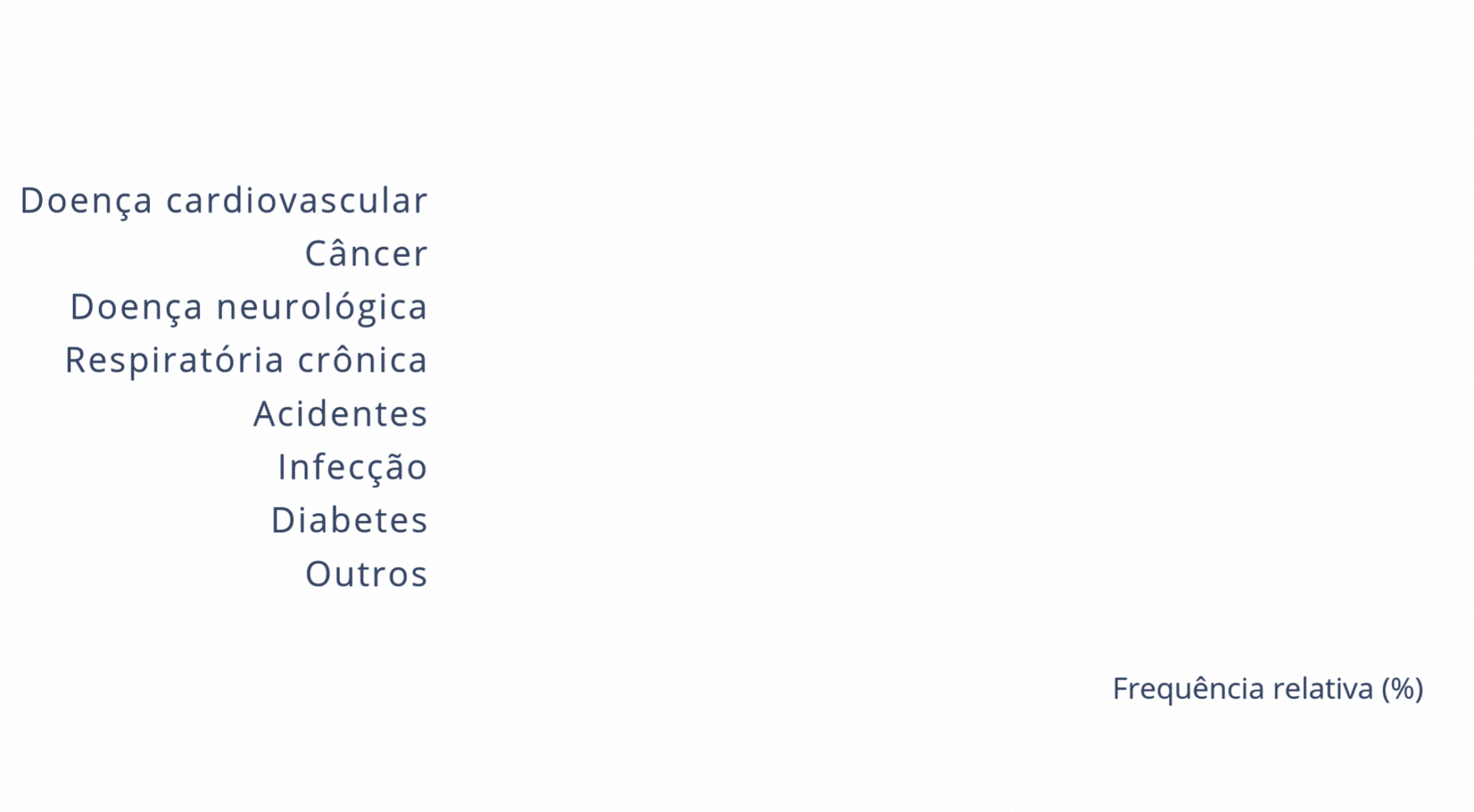Operating market.
The search for solutions that bring longevity with quality of life in Brazil is now possible, as studies advance for product registration and use of stem cells, and for R-Crio's client, who can use the cells if necessary, supported by Anvisa's regulations.
Overview
Chronic and degenerative diseases represent one of the greatest challenges for global and Brazilian public health, especially in a scenario of increasing longevity. With advances in medicine and quality of life, infectious diseases have been largely controlled, but, on the other hand, we have seen a significant increase in illnesses such as arthritis, stroke, heart disease, diabetes, Alzheimer's and Parkinson's. In addition, factors such as inadequate nutrition, sedentary lifestyle and exposure to pollutants have contributed to the incidence of cancer, muscular and respiratory problems.
Leading causes of global mortality

Source: Our World In Data, Causes of death, 2019
Global perspectives
In the short term, healthcare systems are already facing challenges due to the growth of these conditions, resulting in high treatment costs and an impact on patients’ quality of life. In the medium and long term, the elderly population is expected to increase significantly — in Brazil, for example, it is estimated that by 2050, 30% of the population will be over 60 years old. This population aging requires innovative solutions to ensure not only a longer life expectancy, but also healthy aging. In this context, regenerative medicine and cell therapies, such as the use of stem cells, emerge as a hope for reversing or delaying the damage caused by these diseases, promoting a more effective and personalized approach to healthcare.
Expectativa de vida do Brasil e Mundo
Source: Our World In Data, Life Expectancy 2023

Mesenchymal stem cells in the spotlight in academic and scientific circles.
Mesenchymal stem cells (MSCs) have emerged as one of the main focuses of regenerative medicine for the treatment of several degenerative and inflammatory diseases. Their versatility allows them to differentiate into multiple cell types, including bone, cartilage, muscle, neurons and even insulin-producing cells. In addition, they have natural immunomodulatory and anti-inflammatory properties, which makes them promising for the treatment of autoimmune diseases, musculoskeletal injuries, heart disease and even neurological conditions, such as stroke and Alzheimer's.
The academic community has invested heavily in research on MSCs, with more than 8,000 scientific articles published in 2021. Universities and research centers have explored their therapeutic potential for tissue regeneration and the development of personalized biological medicines. The cryopreservation approach for these cells has also been gaining relevance, as it allows them to be stored young and healthy for future use, maximizing their regenerative potential and opening doors to innovative and less invasive treatments.

Source: PUBMed, 2023
Use of stem cells in Brazil and regulatory frameworks .
Contrary to what many people think, we are quite advanced in terms of the use of stem cells in Brazil. This is because Anvisa has already brought great advances to this technology in Brazil, based on regulations from places where these therapies are already frequently performed, such as Japan, the USA and Europe.

Anvisa's latest resolution, published in 2020 and revised in 2021, sets out the rules on how researchers with advanced and proven treatments can register cell therapies commercially, with a package insert, patent and trade name.

Created in 2018 and revised in 2021, this resolution presents the best way to carry out clinical trials (research with people) with stem cells, including how to declare the results and recruit qualified professionals.

Published in early 2018, and also revised in 2023, the resolution provides for the existence of laboratories called Cell Processing Centers (such as R-Crio), prepared to store but also deliver stem cells for therapies.
Advanced Cell Therapy Products (ATPs) approved worldwide.
There are several approved advanced cell therapy products around the world, according to the Alliance for Regenerative Medicine website. See below some approved products.
Source: Alliance for Regenerative Medicine, 2025
